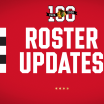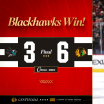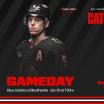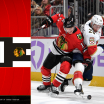For the last few decades, it's as though Chicago hockey fans would tune in just to hear Pat Foley read names from a phone book. He's been that distinctive as a Hall of Fame broadcaster for the Blackhawks, on TV and radio -- a comfortable voice that pierced cold winter nights.
Alas, we have a problem. When was the last time you saw a phone book? They used to be in phone booths, but there aren't many of them around now either.
And here's the larger issue. Foley is about to make his last call. It will be April 14, when the Blackhawks engage the San Jose Sharks at the United Center. He started in 1980 at age 26, a local kid unknown to a market he soon would captivate. Foley completes what he terms a "fairy tale" career as the most enduring and fondly recognized announcer in franchise history.
VERDICT: Voice of a Generation, Foley Set to Sign Off After 39 Seasons
Pat Foley to wrap 'fairy tale' career this week as team's longest-serving broadcaster
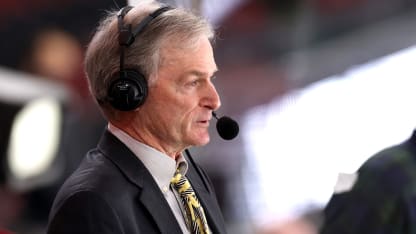
PAT FOLEY LINKS
MORE: Pat Foley - Cheers to 39 Years
INSIDER: Foley and Olczyk Reminisce Ahead of Final Game Together
Foley is not signing off so he can play golf. He already does more of that than professionals who do that for a living. Nor is Foley departing because he has lost his passion or his pipes or his ability to keep up with the fastest of games.
"But I'm going to be 69," Foley says. "As much as I still love what I do and love hockey, it can be a grind. I've done fewer games than ever this season, and I have enjoyed it. I've taken three golf trips, which would have been unthinkable when I did this full-time. I just don't have 82 in me anymore. That's a lot of games, and 82 is not for me. Will I never step behind a microphone again? Not saying that. But not full-time."
On Foley's last road assignment with the Blackhawks, to Minnesota in mid-March, he took the team's trainers and equipment staff to dinner. He's done that every year, because his involvement in the sport's culture doesn't end when the show is over.
"Hockey is not only the best game, but it has the best people," he says. "When I began with the Blackhawks, Stan Mikita had finished playing. But he was all class. And he passed that on to Keith Magnuson, who passed it on to Doug Wilson, who passed it on to Dirk Graham and on and on. Take care of people, the community. Look after the trainers. They work crazy hours, they're always there for you, loyal, dedicated. I was never a player, but it was the thing to do."
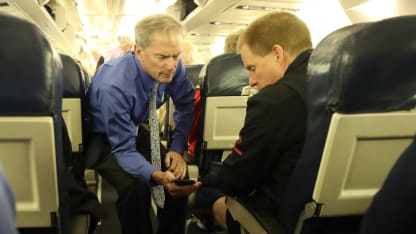
Foley's father, Bob, owned a highly successful Buick dealership in the north suburbs. Buick sponsored Cubs games on WGN Radio. One day, Dad was invited to a game to talk cars between innings.
"He brought me with him," Pat recalled. "I'm 10, in the booth with Jack Quinlan, a terrific broadcaster, and Lou Boudreau, a legend, his color guy. They're Mr. Quinlan and Mr. Boudreau to me and I'm in awe. They welcomed me. Big time. Anyway, after Dad says a few words and makes his pitch, one of the WGN people says to Dad, 'nice job, we'll take you back to your seats.' Quinlan says to Dad, 'if you're going back to your seats, Bob, he stays here.' Quinlan points at me.
"Don't know why. I'm a kid in the Glenview Little League. Maybe I asked him a few questions. Or he could sense I was really into it, which I was. We stayed in the booth the whole game. When I got home my mom, Mary, said I told her, 'I know what I want to do.' Never gave a thought to broadcasting. But now, I knew."
Brian Foley recalls when his older brother declared his plan.
"He said he was going to college to be a broadcaster," said Brian. "Well, OK. You can say you're going to study to be an actor. Fine. But what the are chances you'll be a success? Or make it big? He was just driven. He's got a terrific voice, perfect for hockey. But it was more than that."
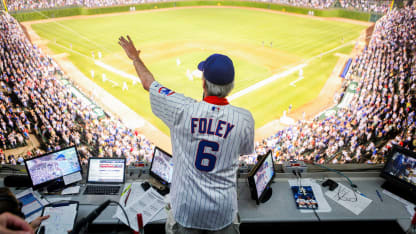
Pat attended Michigan State, where he graduated with a telecommunications degree. His first play-by-play experience was women's basketball. His first real job was broadcaster for the Grand Rapids Owls of the International League. With Grand Rapids, Foley also handled public relations and sales. He wore a lot of hats.
"And tried to sell T-shirts, with limited success," he recalls. "Then the Owls folded, so I'm looking for work in 1980. I've got resumes and tapes out all over the place. I had one offer, from the Erie Blades. Meanwhile, the Blackhawks are without a broadcaster. Andy MacWilliams had had voice problems the previous year and was replaced by Bud Kelly. Also, they're without a radio outlet. They had a contract with WCFL-1000, but they changed to a religious format and didn't want hockey anymore."
Enter Bob Foley, again. One of his regular customers was Michael Wirtz, brother of Blackhawks President Bill. When Michael retrieved his automobile from a service stop at the dealership, he just happened to discover that his vehicle's tape deck featured a sample of Pat's work from Grand Rapids.
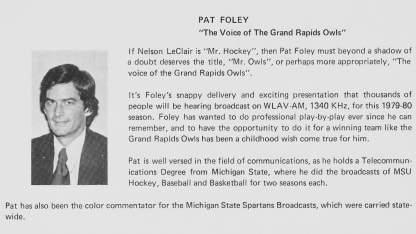
"To make a long story short, I had an offer in Erie but had to give them an answer, soon," Pat went on. "I'm close to being out of a job and out of hockey, at least for a year. Well, Michael passed that tape along. Then I got a call from Bill Wirtz's secretary. Could I come see him at his office? Absolutely. I get the job. Or rather, my father got me the job. The Blackhawks finally find a station, WYEN-FM, which I want to say was 103.5. Not exactly your 50,000-watt blowtorch.
"For the first five games of the 1980-81 season, there were no radio broadcasts. I make my debut for the sixth game, the same night the Blackhawks retired Stan Mikita's jersey at the Stadium. October 19, 1980. Great night for a great man. I did play-by-play from a fabulous perch attached to the first balcony. Traveled with the team, commercial flights in those days, a lot of middle seats. Did all the games by myself. No sidekick. And I'm making $200 a game. The start of my fairy tale."
As one would expect of a franchise approaching its 100th anniversary, the Blackhawks have been seen and heard by a number of announcers from a variety of backgrounds. One of them, Johnny Gottselig, played for the team during the 1920s, '30s and '40s, then went to the broadcast booth. He was there when the Blackhawks won the Stanley Cup in 1961.
Before Foley, Lloyd Pettit was a popular voice on TV and radio, famed for his "a shot and a goal!" on a scoring play. Pettit also deftly described on-ice fights with blow-by-blow commentary.
Pettit worked a lot of baseball, as did several of the Blackhawks' broadcasters. Bob Elson, a Hall of Famer, forever called the White Sox on radio in the summer, and at various times, the Blackhawks in the winter. When the snow fell, Boudreau, a Hall of Fame shortstop, could be found talking about the Blackhawks.
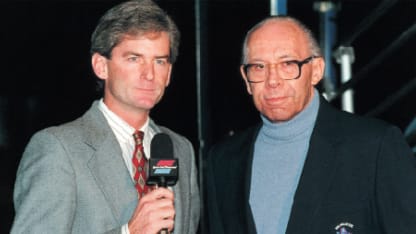
Hal Totten and Bert Wilson, baseball broadcasters way back when, took the mic for the Blackhawks, too. So did Jim West, of more recent vintage. Harvey Wittenberg was on the air and then served as public address announcer. There was Ken Wilson and, well before him, Joe Wilson, fondly known as "Whispering Joe Wilson" from his roots as a bowling announcer.
But nobody did it longer, or better, than Foley. He described winners. And when Foley watched the struggling Blackhawks so you didn't have to, he was the face of the franchise. Even on radio.
"Lloyd was my idol," he said. "I grew up listening to him and had the honor of interviewing him when I did a game in Milwaukee with the Owls. He was very encouraging. Unbeknownst to me, Lloyd was in the back of the booth listening to me for a few minutes that night. He had some nice things to say about how he envisioned my future.
"But there were so many pros in the business who I admired and liked hanging around with. Dan Kelly, the legend, took me under his wing for some reason. We built this routine of having dinner at least once a year, usually when he came to Chicago with the St. Louis Blues. One time we made an appointment. 'Meet you at Gate 3 1/2' at the Stadium after the game.
"Game is over, I go to 3 1/2 and here's Dan with his wife, Fran. I say to Dan, 'Why don't you two go for dinner by yourselves? I thought it was going to be just us two.' Dan looks at me and says, 'we made a dinner date, you're going.' So, we go to Gene and Georgetti's, and I find out it's their wedding anniversary! Fran comes up from St. Louis to celebrate and she has to sit down to dinner with this kid. Of course, we had a great time. Always did with Dan."
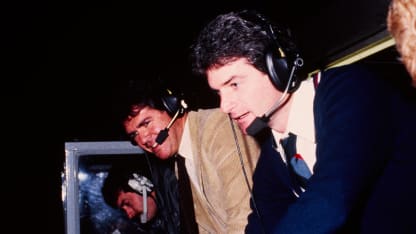
"I've been blessed to meet people like him, and to have the color men I've worked with," Foley continued. "Dale Tallon was great, same with Troy (Murray) and Gardsy (Bill Gardner). And Eddie (Olczyk), what can I say about him? He's not only the best analyst in hockey, he's the best in sports. And a great, great friend.
"I've had so many because of this job. And as I said, the best part of hockey is the people. Stan Mikita, Keith Magnuson, Tom Lysiak, to name just a few. They're all gone, but I was lucky enough to have long-term relationships with them. You get to know their wives, their children. Special bonds forever."
It is no coincidence that Foley's last broadcast was timed for Thursday night's United Center visit by the Sharks and Doug Wilson, their longtime general manager. But shortly after Wilson's November induction into the Hockey Hall of Fame, he took a medical leave. Thus, the former star Blackhawks defenseman will be absent.
"He's always on my mind," said Foley. "I think about Willy every day. I miss him. We all miss him. We all love him. I pray for him."
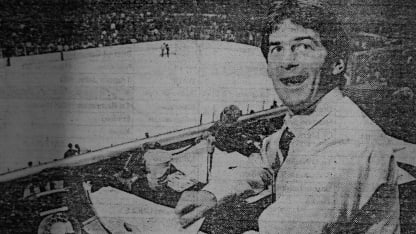
Packing a crisp, booming delivery, Foley crafted signature calls such as "BAAAANERMANNN!!" They are too numerous to list, but they comprise a legacy of extemporaneous genius. You don't do what he's done and earn all his many awards because of cue cards and reams of preparatory notes. He's endeared himself to fans because he is at once an unabashed fan of the Blackhawks and an honest observer. He might not have been as frequently blunt as Harry Caray ("what a lousy ballclub"), but if the Blackhawks had a difficult night, Foley refused to deodorize what he witnessed.
"I respect the audience too much," Foley said. "I was there for them. I always wanted the Blackhawks to win. I tried to paint them in the best light possible. But if they play a stinker, I'm going to say so. I have to describe what I see, not what I wish I would see. Fans want the truth. They are smart. They know what they're watching and I respect them too much to tell them everything is rosy with their team when it isn't.
"That said, we are in the toy department. I know that sounds cliché, but this is the entertainment business. The players take their jobs seriously, as does management and ownership, and I take mine seriously. But if we can have a laugh or two during the game, as I did with Dale all the time and Eddie, why not? Try to be informative but keep it light to a point. It's a game. The greatest game, but still a game. And fans deserve an honest call.
"I forgot which year it was, but it was a rough one for the Blackhawks. After it ended, I said that they were out-played, out-coached, out-worked, out-hustled. Pretty much out-everythinged. A while later, I saw Bill Wirtz at a charity outing. I said to him, 'did I bury your team too much?' He looked at me and said, 'nah, I think you were too easy on them.'
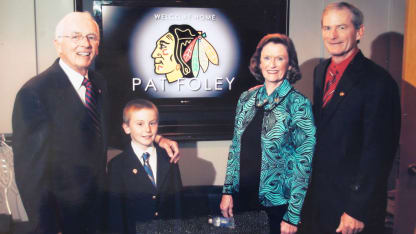
"I've rubbed some people wrong, no question. Said some dumb things. And don't forget. I got fired from the Blackhawks in 2006. I never thought I would come back, but after two seasons, John McDonough brought me back. Very grateful for that. Meanwhile, where do I wind up after getting canned? With the Chicago Wolves, another great organization. I get the boot and still wind up broadcasting in my hometown. Another chapter in the fairy tale."
Anyway, to borrow from a Hall of Fame voice, we hope you enjoyed the column, in spite of the outcome. Pat Foley is going off the air and heading to the golf course. This much is for sure: he birdied his childhood dream and became a scratch broadcaster.


